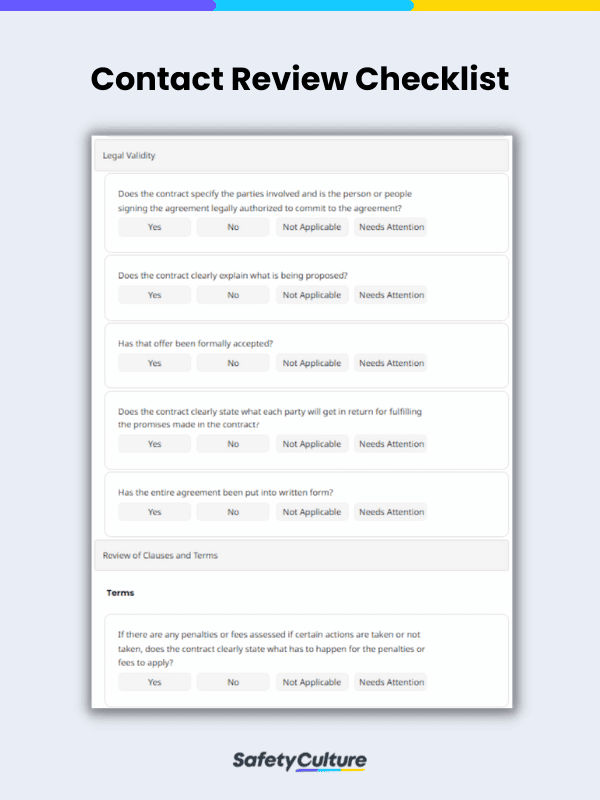What is a Contract Review Checklist?
A contract review is a process in which the most important provisions of a legal agreement are identified and assessed before a contract is signed. Reviewing legal documents, such as contracts, is an integral part of the due diligence process. Therefore, a contract review checklist might be helpful in ensuring that there is a documented system of processes, activities, and checks that a party goes through when creating and reviewing contracts.
Why You Need a Contract Review Checklist
Since contracts are legal documents, it’s important to ensure that the interests of both parties are protected. This is why contract reviews are conducted to maintain an organized process when reviewing contracts, thus increasing accuracy and time-efficiency.
A contract review checklist will help you:
- ensure you’re editing out common loopholes that don’t serve either or both parties’ interests;
- establish terms in the event of a party breaking the contract;
- avoid exposing the business to potential risks due to non-compliance with contract law;
- aid in conducting due diligence; and
- reduce the vulnerability of the business to costly events which could lead to damaging effects on operations and business partner relationships.
What Should Be Included in a Contract Review Checklist
Your contract review checklist must contain all the necessary details within a contract that need to be checked and addressed prior to sign-off. According to Lexology and Contracts Counsel, a contract review checklist should include the following sections:
Review of Clauses and Terms
Ensure that the clauses and terms used in the contract are clear and appropriate. Thoroughly review the sections on indemnification, dispute resolution, confidentiality, and termination. Keep an eye out for any mistakes or wrongly-used terminology.
Checking of Termination and Renewal Guidelines
To avoid getting locked into an agreement longer than what’s expected, contracts must describe the renewal and termination guidelines. Some agreements also include automatic renewal and opt-out terms to provide more flexibility to both parties. Additionally, ensure that there are established rules on the repercussions should one party fail to notify the other by a certain date.
Usage of Clear Contract Terminology
Contracts that have unclear or biased provisions are more likely to cause disputes and conflicts (i.e., payment delays). This is why it’s important to heed how each line in the contract is worded. Therefore, list down the vague terms and parts to discuss with the other party. Review and revise any confusing terms and jargons without proper context, so that the necessary edits can be made before the actual contract signing.
Availability of Default Terms
To protect both parties’ interests, the contract’s default regulations should be in place. With this, check if there are available rules that govern default occurrences. This is crucial in knowing the potential consequences of not fulfilling your obligations and what the legal recourse is if the other party fails to comply.
Review of Deadlines and Key Dates
Dates and schedules help set expectations for both parties, and having these clearly stated in the contract is key to preventing issues with the pacing of deliverables.
It will also help if there are guidelines to follow when there needs to be changes in terms of the deadlines and schedules. Acknowledging that unexpected events are bound to happen allows for flexibility in the contract without compromising the other provisions set therein.



